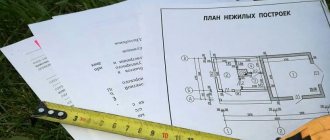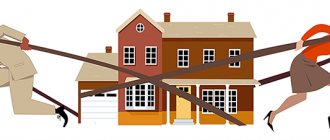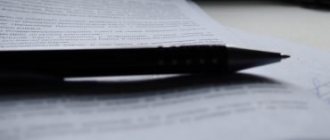The likelihood of running into scammers when buying a country house or dacha is much less than, say, when purchasing city real estate: the scope of the market is not the same. At the same time, in addition to the risk of contacting black realtors, transactions for the purchase and sale of dachas have a number of their own characteristics.
One way or another, incorrect information in one of the documents or an incomplete package can seriously come back to haunt the buyer in the future. That is why, in order to ensure that the country real estate that you have dreamed of for so many years does not turn into a source of problems poisoning your life, it is necessary to carefully check the seller’s documents. Below are nine key points that should be of particular concern to buyers.
Availability of a complete package of title documents
After the future owner has chosen the site he likes and agreed on its price with the seller, he should check the availability and (which is important) the condition of the title documents. Their presence is necessary both for the plot of land and for the property itself.
The main purpose of such a check is to make sure that the seller’s ownership arose legally. If the seller, for one reason or another, refuses to present the requested documents, it is better to refuse the transaction to purchase a dacha. Or, as an option, wait until the documents are restored (if they were lost).
What amount should be indicated in the house purchase and sale agreement?
Starting from 2021, you do not have to pay 13% personal income tax on housing sales transactions if it was your only home and you owned it for 3 years or more. Previously, only those who owned housing for at least 5 years could receive personal income tax benefits. Therefore, an owner who has owned a house for less than 3 years will most likely offer to indicate in the contract an amount of up to 1 million rubles. You have the right to refuse, especially since starting from 2021 the tax is calculated from 70% of the cadastral value of the property if the purchase and sale agreement specifies an amount less.
If the amount is full, and the house has been owned for less than 5 years, then you will have to compensate the seller 13% of the amount over 1 million rubles specified in the contract, which is not economically feasible, since you are giving the money now, and will return it within a few years in installments and only if you have not returned income tax before. If the amount in the contract is more than 70% of the cadastral value of the house, then 13% of the tax will be calculated from it.
The higher the amount in the agreement, the greater the tax deduction you will get back, and in the event of a form majeure or termination of the transaction, you will be returned only the amount specified in the agreement.
How to get a tax deduction when buying a house
On state registration of the seller's property rights
The presence of such registration is documented. Starting from July 2021, such a supporting document is an extract from the Unified State Register of Real Estate.
It should be noted that concluding a transaction to purchase a dacha is possible even if the seller does not have the original title documents, provided that the ownership right is registered in the Unified State Register of Real Estate.
Thus, the loss of a paper document by the seller is not yet a reason to refuse the transaction. If you request an extract from the Unified State Register of Real Estate, you can personally verify that the seller is really the owner of the property put up for sale. It also contains information about the presence (absence) of encumbrances on the object of sale.
How to purchase a home remotely
- Ask questions about the house by phone, or better yet, by video call (Viber, Skype) so that you can immediately see the points that interest you;
- Request documents for verification by email in scanned form;
- If the documents are in order, then draw up, sign and send to the seller by mail 2 copies of the deposit agreement (preliminary purchase and sale agreement) with a request to send you the 2nd copy signed by the seller;
- When the signed agreement on the deposit is in your hands, transfer the deposit specified in the agreement from the bank card to the seller’s card, indicating in the comments to the payment “Deposit for the purchase of a house before agreement No. 1 from xx/xx/xxxxx dates”;
- Next, you come to the MFC for the transaction, sign the main purchase and sale agreement, transfer the remaining amount to the buyer and submit documents for registration, including the deposit agreement;
- In order not to come to the MFC for documents after registration, you will have to look for an authorized person (usually this person is the realtor conducting the transaction) and register a notarized power of attorney for him (~ 1000 rubles) for the right to receive documents at the MFC instead of you and then send the documents to you by mail (it’s better to specify this condition too).
If you do not have the time or opportunity to physically visit the MFC, then I recommend using the so-called “on-site service” - this is a convenient way to receive the services of Rosreestr and the Federal Cadastral Chamber. Using the on-site service, you can obtain information from the Unified State Register, register rights to real estate, register for cadastral registration, and correct a technical error in the Unified State Register information. Veterans and disabled people of the Great Patriotic War, disabled people of groups I and II who are property owners, are provided with free on-site services.
You can apply for on-site service by calling: 8 (800) 100-34-34, as well as by email indicated on the FKP website.
Carrying out land surveying
If the seller's ownership of the land arose before 2000 (the period in which the unified cadastral registration system was formed), then it may not have agreed boundaries. That is why, in order to avoid misunderstandings in the future, with neighbors, you should demand that the seller carry out land surveying.
Important: starting from 2021, registration of transactions related to the purchase and sale of plots that do not have agreed boundaries will not be carried out.
What documents need to be checked when buying a summer house?
Buying a summer house differs from buying a city apartment in that in this case you need to take into account many more factors. The buyer should be interested not only in the condition of the dacha and the legality of the seller’s rights to it, but also in the purpose of the plot, whether it has boundaries and the absence of restrictions.
The set of documents that the dacha owner is required to provide for the transaction includes documents for the land plot, house and outbuildings, as well as documents confirming the identity of the seller. Experts always advise starting an inspection with land documents.
What documents are needed to purchase a plot of land?
The only document confirming the seller’s rights to the land plot today is an extract from the Unified State Register of Real Estate. Some dacha owners may still have old-style property certificates. However, to carry out the transaction, you need to ask them to prepare an extract from the Unified State Register of Real Estate. It contains up-to-date information about who is the owner of the dacha.
What can you learn from an extract from the Unified State Register of Real Estate?
Presence of encumbrances on the site. If the plot is seized due to the fact that the owner has debts, this can also be found out from the extract from the Unified State Register of Real Estate. The seller could obtain a loan from a bank secured by land, then until the debt is fully repaid, he has no right to dispose of this property.
The purpose of the land and its permitted use. The extract contains information about what objects the owner has the right to place on the site. The document provided by the seller must state that the plot is intended for gardening, individual housing construction (IHC) or personal farming. It is allowed to build a residential building on plots with this purpose. Both a residential building and a garden building (intended for temporary residence) can be built on a garden plot.
Does the site have boundaries? The buyer must insist that the site be surveyed by the time the dacha is sold. Experts advise purchasing only plots whose boundaries are defined. In this case, you can be sure that the area of the plot is exactly as stated by the owner, and the boundaries of the dacha do not intersect anywhere with the land of the neighbors.
Instructions: How to survey a plot of land?
You can check whether land surveying was carried out or not by requesting an extract from the Unified State Register of Real Estate, or, knowing the cadastral number of the land plot, find it on the public cadastral map of Rosreestr. If the site has no boundaries, the island will appear on the map.
It is recommended to invite a cadastral engineer for consultation before purchasing a dacha, even if land surveying has been carried out. This will make sure that the boundaries of the site indicated in the documents correspond to reality.
No restrictions on the use of the site. You can also find out whether a plot falls completely or partially into a zone with special conditions for the use of territories (ZOUIT) from an extract from the Unified State Register of Real Estate. Therefore, experts definitely advise ordering an extended extract from the Unified State Register of Real Estate, which contains this information.
Instructions: How to obtain an extract from the Unified State Register of Real Estate?
Restrictions on the use of a land plot depend on the type of zone (airfield area, flood zones, water protection zone, sanitary protection zone, roadside strips of highways, pipeline protection zone). For example, if a site is within the boundaries of the security zone of electric grid facilities, construction, major repairs, reconstruction or demolition of buildings on it is prohibited without the written consent of grid organizations.
What specific restrictions on the use of land plots are imposed by the location of a plot within a certain zone are established by regulatory legal acts for each zone. For example, restrictions on the use of land plots falling within the boundaries of the security zone of electric power facilities are regulated by government resolutions No. 160 of February 24, 2009 and No. 1033 of November 18, 2013.
Restrictions on the use of the land remain after its sale. Therefore, information about the location of a land plot within the boundaries of a zone with special conditions of use must be indicated in the land purchase and sale agreement.
What documents are legal?
In addition, you need to check the title documents that the seller has. These are the documents on the basis of which he owns the house and land:
- contract of sale,
- privatization agreement,
- certificate of inheritance,
- gift agreement.
“The title documents should be checked for each property separately,” advises Vera Razumovskaya, head of the legal service of the Krasnoyarsk real estate sales workshop “Remeslennik”. “However, you need to understand that the documents for the plot will not always coincide with the documents that the seller has for the house. For example, a seller could buy a plot of land, in which case the title document for the land is a purchase and sale agreement, and then build a house on it, which he registered as ownership in a simplified manner “under the dacha amnesty.” Then the title document for the house will be the construction declaration. By the time of sale, the house must already be registered as a property.”
How to check the seller?
The seller's verification takes place in two stages. First, you need to make sure that the seller is who he says he is. Secondly, make sure that at the time of selling the dacha he does not have financial problems that could lead to the deal being declared invalid in the future.
Where can I check the seller's documents?
You can check whether the seller’s passport is valid on the Ministry of Internal Affairs website. To do this, enter the series and document number in the search bar.
“A mark that your passport is invalid does not necessarily mean that you are dealing with a fraudster. The seller could simply not change his passport in time when he turned 45, so the document is listed as invalid,” explains Vera Razumovskaya.
If the owner is represented by another person in a transaction by proxy, the power of attorney is checked. You can find out whether a power of attorney was issued or not, and whether it is currently valid, in the Unified Notary Information System. The power of attorney verification service is publicly available here. In order to use it, you need to know the date the power of attorney was received, its number and the name of the notary who issued it.
“When we see from the title documents that the seller received the dacha as a result of a paid transaction (bought or received under an exchange agreement), we find out whether he has a spouse. If at the time of acquiring the land he was married, the transaction will require the consent of the spouse to sell the dacha certified by a notary. If the seller is not married, we ask him to write a statement about this, it will also be attached to the package of documents,” says Vera Razumovskaya.
How to find out if the seller has debts?
As with the purchase of a city apartment, when purchasing a dacha, the seller is checked for possible bankruptcy. If the seller is declared bankrupt, all transactions made by him during the previous three years may be declared invalid in the future. At the time of the sale of the dacha, the seller should not be listed in the Unified Federal Register of Bankruptcy Information among those who filed for bankruptcy.
In addition, you should check information about the owner of the site on the bailiffs website. He should not have debts that they are trying to forcefully collect from him.
What documents for buildings need to be checked when buying a summer house?
A separate extract from the Unified State Register is ordered for buildings located on the site . From it you can understand which objects are registered on the dacha land. This can be a residential building and non-residential buildings (garage, bathhouse, outbuildings).
If there is a residential building on the garden plot in which registration is possible, the set of documents that must be requested from the owner for the transaction includes a house register . From it you can find out who is registered in the house. The house book is an A4 album.
It often happens that the house register is kept not by the owner himself, but by the village administration. Then you need to get an extract from it. From this document it should be clear that at the time of sale of the house there are no registered persons remaining in it. If there is a garden house on the plot, a house register is not needed to complete the transaction.
Additionally, experts advise asking the seller for a certificate confirming that there are no debts for electricity, membership fees to SNT or for garbage removal . Such a certificate must be issued by the chairman of the gardening partnership or the village council.
“By the time it enters the market, the owner does not always have all the necessary documents. Most often they have to be collected during preparation for the transaction, this leads to an increase in terms,” notes Vera Razumovskaya.
All of the above is just a general set of documents that you need to request from the seller when preparing to buy a summer house. Depending on the situation, additional documents may be required. For example, if it follows from the documents that there are minor children among the owners of the house, the sale will also require the consent of the guardianship authorities.
Marks in the cadastral passport
Before signing a purchase and sale agreement, you should request a cadastral passport from the seller and, according to the information contained therein, check for the following compliance:
- Are the boundaries of the site agreed upon?
- Is the site included in the water protection zone?
- Is there information about the laid gas pipeline and other communications?
This information significantly influences the possibility of construction in the future and the possibility of legitimizing the existing “samostroy”.
After 2000, when cadastral passports were abolished, all of the above data can be found in a generalized extract from the Unified State Register of Real Estate.
Procedure for buying a house from the owner
- Before the transaction, it is better to entrust the verification of documents for the house and land to a lawyer;
- After checking, leave a deposit to the seller and agree on the date and place of the transaction in the “My Documents” MFC;
- In the MFC building, take an electronic coupon and, while you wait in line, carefully read the purchase and sale agreement, pay the state fee for the transfer of rights and make copies of payment receipts;
- When it’s your turn, go to the registration desk to sign contracts and process the purchase and sale. You can carry out a simple transaction (without a mortgage or shares) yourself - the registrar will always advise you;
- After signing the contracts, in the presence of the registrar, the buyer pays the seller, or the parties go to the bank for a cashless payment;
- At the end, the registrar will issue a receipt of the original documents indicating the date of issue of the registered agreement on the transfer of ownership to the new owner (usually 14 days).
How to transfer money when buying real estate
Please note that when selling a house, the buyer acquires the right to use the corresponding land plot under the same conditions as the seller of the property. This means that if the ownership of the house was registered in Rosreestr, then the new owner automatically becomes a tenant under the lease agreement on the same terms as the old tenant - this is called universal succession.
In other words, you can sell your house without transferring the lease on the land.
Purpose of the site
An important point is the type of permitted use of the site (UR). As a rule, documents for summer cottages contain the following purpose statements:
- "for gardening";
- or “for country house construction”.
If this is the case, then everything is fine - there is no need to develop and obtain permits for construction.
Rarely, there are situations when the type of permitted use of the site does not involve the construction of a private house. This, for example, may include wording such as “for gardening,” etc. It should be noted that the construction of any capital structures with such wording of purpose is not permitted by law.
Connection (ability to connect) to utility networks
One of the most significant criteria that can influence the final decision of a potential buyer is the connection (or the ability to connect) of a house located on the site to utility networks. That is why it is necessary to focus on permitting documents confirming the legality or possibility of such a connection.
Having arrears in paying utility bills
When buying a dacha or country house, the future owner must minimize as much as possible the risks caused by the seller’s debt to pay for housing and communal services and other obligatory payments, including taxes. For these purposes, it is also necessary to request supporting documents from the seller.
If, when you request correctly executed documents, the seller of a summer house or house with a plot assures you that this is “nothing” or is in a hurry with the transaction, it is better to look for another property to purchase. If the property is so good and profitable that you are willing to take some risk, it is recommended to engage a professional lawyer or realtor to conduct such a transaction.
Did you find this article helpful? Please share it on social networks: Don't forget to bookmark the Nedvio website. We talk about construction, renovation, and country real estate in an interesting, useful and understandable way.
What are the risks when buying a house on your own?
Of course, you want to buy a house cheaper, and if something happens, sell it at a higher price, or at least stay with your own. But when you are in a hurry and try to save on everything, there is a risk of buying real estate on emotions. Such races often result in additional expenses for connecting communications and major repairs. For example:
- You chose the cheapest option and saved on the purchase, and then you find out that the foundation was cracked and you cannot live in the house without major repairs;
- The seller promised you to connect your house to gas under the Federal program, but it turned out that the laying of the gas pipeline and installation of the ShRP will be carried out at the expense of the owners.
There is no need to strive to buy the cheapest house. Real estate is not a supermarket; promotions and discounts simply don’t happen here.











